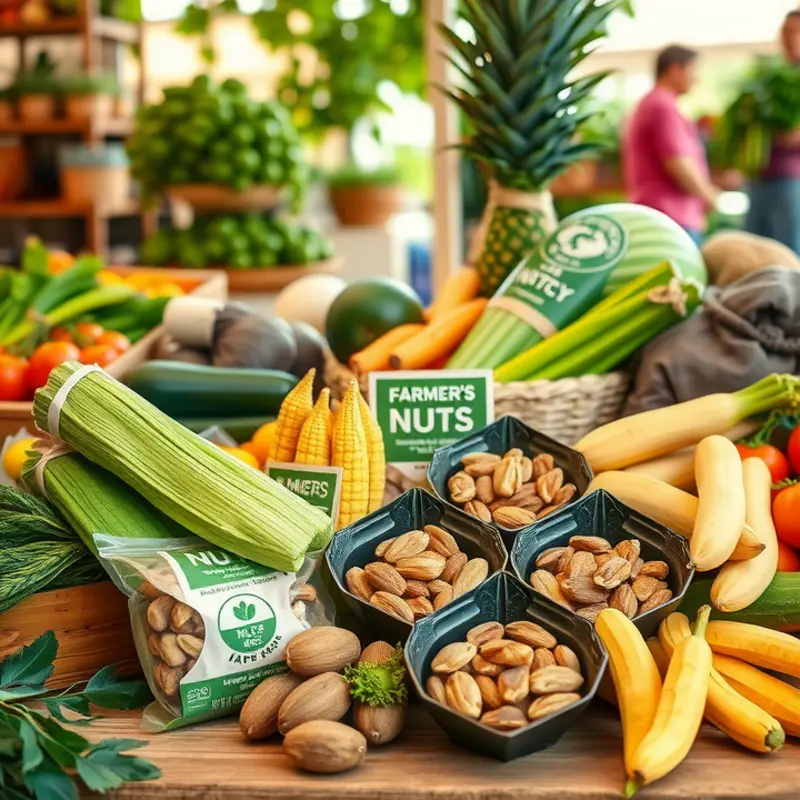As more individuals seek to align their dietary choices with environmental consciousness, ethical nut sourcing emerges as a vital aspect of this journey. Nuts are nutritious and delicious, but their production can significantly impact the planet. Understanding how to choose sustainably sourced nuts enables consumers to enjoy a healthy diet while minimizing ecological footprints. Here, we explore the importance of ethical sourcing, the challenges within the industry, and actionable steps for making conscientious choices.
The Environmental Impact of Nut Production

The allure of nuts in our diets owes much to their nutritional profile. However, the journey from farm to table often leaves a substantial environmental footprint. Conventional nut farming practices tend to contribute to deforestation, substantial water consumption, and excessive pesticide use, all of which have far-reaching effects on ecosystems and climate stability.
Deforestation emerges as a significant concern, especially with the cultivation of nuts like almonds and cashews. Expansion of agricultural lands often results in the clearing of forests. This not only releases stored carbon dioxide, exacerbating climate change, but also leads to the loss of biodiversity. Fragile habitats are disrupted, and numerous plant and animal species face the risk of extinction.
Water usage in nut production is another pressing issue. Almond farming, for instance, is notorious for its thirst; it takes approximately one and a half gallons of water to produce a single almond. In water-scarce regions, this poses a severe challenge, placing additional pressure on already strained water resources. The availability of fresh water for local communities and natural ecosystems dwindles as more water is diverted to sustain nut orchards.
The liberal application of pesticides in conventional farming adds to the environmental burden. Pesticides may help in controlling pests and ensuring crop yields, but they can also lead to soil and water contamination. When these chemicals infiltrate local ecosystems, they disrupt natural processes and contribute to the decline of pollinator populations like bees, which are crucial for the overall health of agriculture.
In light of these challenges, it’s imperative to support nut farms committed to sustainable and regenerative practices. Such farms employ agroforestry techniques, integrating trees and crops to enhance biodiversity while maintaining the land’s productivity. This method not only mitigates deforestation but also improves carbon sequestration, helping combat climate change.
Sustainable nut farming also emphasizes efficient water management. Employing drip irrigation systems and rainwater harvesting can significantly reduce water usage. These approaches ensure that water is used sparingly and judiciously, preserving valuable resources for future generations.
Moreover, organic farming practices eliminate the reliance on synthetic pesticides. Through companion planting and natural pest deterrents, organic farms maintain crop health without compromising environmental safety. These methods protect soil quality and encourage the proliferation of beneficial organisms within the ecosystem.
To nurture an eco-friendly and ethical approach to nut consumption, consumers are encouraged to learn more about sustainable farming practices. Reinvigorating our connections to the foods we eat means supporting and prioritizing purchases from farms that are kind to the planet. Incorporating conscious choices in your diet can have an impact, as these decisions spread awareness and demand for sustainable alternatives.
Practically speaking, exploring resources dedicated to sustainable eating can provide valuable insights. For those interested in reducing waste in cooking and preparation while embracing eco-conscious habits, consider visiting resources on low-waste cooking prep. By aligning our eating habits with environmental responsibility, we contribute to a healthier planet, one mindful choice at a time.
How to Choose Ethical Nuts: A Practical Guide

Choosing nuts with ethical sourcing requires being well-informed about certifications and farming practices. Fair Trade and Organic certifications are crucial indicators. Fair Trade ensures fair wages for farmers and workers, promoting sustainable practices and community development. When you buy products with the Fair Trade label, you’re supporting ethical labor standards and environmental care.
Organic certification is another essential criterion. Organic farming avoids synthetic fertilizers and pesticides, promoting biodiversity and enhancing soil health. This leads to nuts that are not only healthier for you but also for the planet. Check for the organic label on packaging as a quick guide to making a better choice.
Beyond individual certifications, consider nuts from farms practicing regenerative agriculture. This holistic approach focuses on restoring soil health, increasing biodiversity, and drawing carbon back into the ground. Buying nuts from regenerative farms helps combat climate change and supports ecosystems.
Supporting local farmers can significantly reduce the carbon footprint associated with food transport. Local marketplaces or farmers’ markets are excellent sources for finding nuts that are harvested nearby. This not only shortens the supply chain but also supports community economies. Engaging directly with producers allows for better transparency about farming practices and processing methods.
Alternative nut options may offer a smaller environmental footprint. For instance, nuts like hazelnuts and chestnuts typically require less water and fewer inputs than other conventional nuts. Diversity in nut selection is not only beneficial for the environment but also provides a range of nutrients essential for a balanced diet.
Becoming a conscious consumer also involves continuous learning and adapting. Use resources such as eco-smart kitchen storage to reduce waste and enhance sustainability at home. By being aware of our consumption patterns and sourcing preferences, we can make Nutrition choices that benefit not only our health but also the planet’s. Making informed decisions about nut sourcing is a practical starting point in embracing eco-friendly nutrition.
Final words
Choosing ethically sourced nuts not only benefits personal health but also supports environmental sustainability and ethical farming practices. By being mindful of the sourcing of nuts, consumers participate in a larger movement towards preserving ecosystems, enhancing biodiversity, and fostering responsible agricultural methods. Empowered with knowledge about ethical choices and certifications, individuals can confidently incorporate nuts into their diets while championing a healthier planet for future generations. Let’s prioritize these conscious choices in our everyday lives.








